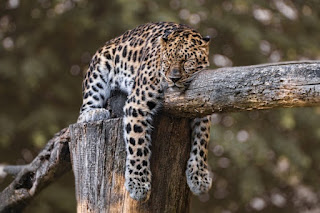The Beneficent Mystery of Sleep
Sleep is something we may take for granted or even resent its intrusion. Others find it a way to escape from the troubles of daily life for a while. Sometimes it simply feels good. While it is considered a restful state, there is a great deal of unconscious activity happening.
There are many studies of what happens during sleep and that it or something similar is vital to most creatures. One evolutionist said that sleep is our default state, and that we evolved wakefulness. No science there, just narrative-friendly speculation.
 |
| Sleeping jaguar, Pixabay / edmondlafoto |
From an evolutionary viewpoint, sleep is silly. Creatures are unconscious or in torpor and very vulnerable. (Good thing most predators need to sleep and recharge as well.) The physiological and psychological benefits of sleep, as well as many processes that occur, are well documented. It should be clear that sleep and wakefulness are beneficent gifts of our Creator.
The other day, when I awoke from a restful sleep, the thought occurred to me that sleep, as an important part of our physical lives, holds some deep evidence of design.
In reviewing research on sleep, I found that a common but somewhat surprising result is the acknowledgement of how incomplete our understanding is of why we sleep in the first place.
. . .
I would suggest that the evolutionary mindset operates as a major obstacle to the scientific understanding of sleep. In presupposing that all animals evolved from a common ancestor and that the universal biological need for the sleep-wake cycle evolved along with all organisms, two unsupported assumptions are exposed. One is that “survival of the fittest” has selected for the counterintuitive process of regularly going unconscious, and the other is that Darwinian mechanisms have the capacity to generate the high levels of information within the designed systems inherent in the process of sleep.
This article is in two parts, and the total is worth reading: "Sleep — Designed for Our Good" followed by "Sleeping and Waking — A Designer’s Gift."